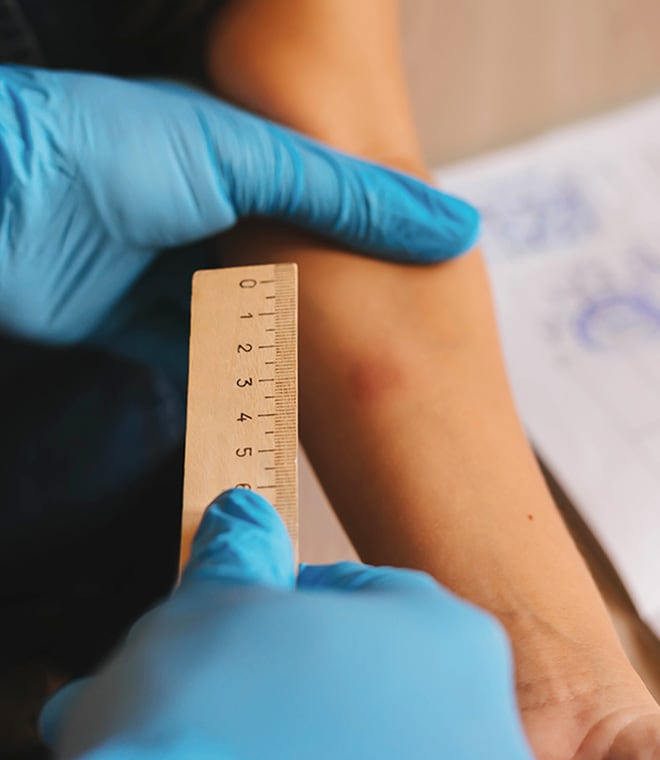Health
How to diagnose pneumonia
By Sanjay “Jay” Patel, DO, Allergy & Immunology Aug 30, 2023 • 5 min
Each year, millions of people in the U.S. develop pneumonia. While most recover, pneumonia can be a deadly illness. In fact, an estimated 55,000 Americans die from the illness annually. The good news is that prompt treatment and vaccination for pneumonia can lower the risk of serious complications. Healthcare providers use a number of different tools to diagnose patients with pneumonia.
How do you know if you have pneumonia?
Symptoms of pneumonia often mimic those of the cold or flu. Some potential warning signs of pneumonia include:
- Difficulty breathing
- Chest pain
- Fever of 102°F or higher
- Persistent chest congestion
- Coughing up yellow or green mucus
- Coughing up bloody mucus
- COPD (chronic obstructive pulmonary disease) or asthma attacks in people who have those diseases
Because it’s not possible to diagnose pneumonia on your own, see your healthcare provider if you experience any of these symptoms, especially if you’re at an increased risk for pneumonia. Also, keep in mind that you may not need to have all of the above symptoms to be diagnosed with pneumonia.
How do healthcare providers diagnose pneumonia?
When you see your healthcare provider with symptoms of pneumonia, they will likely listen to your lungs and conduct a thorough examination as the first step in making a diagnosis.
Your healthcare provider may also order imaging tests, like a chest X-ray or a CT scan (also known as CAT scan), which is a series of X-rays taken from various angles with the help of a computer.
In addition, a healthcare provider may perform a bronchoscopy, which involves inserting a thin tube into your lungs to examine them and possibly take samples of fluid or tissue for further testing. Usually this is only performed for severe cases or after other less-invasive tests.
To prescribe the right treatment, your healthcare provider may order lab tests to determine what type of microorganism is causing the infection. Some lab tests include:
- Blood tests
- Sputum tests, which involve coughing up phlegm
- Pleural fluid cultures, obtained by passing a needle through the skin and muscles of the chest wall into the area around the lungs
Your healthcare provider may want to conduct additional tests to assess how well your lungs are working. This could be done via:
- Oximeter, a sensor placed on your finger that assesses how much oxygen is present in your blood
- Arterial blood gas test to check your blood oxygen levels. The test involves drawing a blood sample from your wrist, groin or arm.
Testing for pneumonia is typically done on an outpatient basis at a hospital, imaging center or clinic. Some providers may perform certain tests, like collecting a sputum sample or checking your oxygen levels with an oximeter, in the office during your examination.
Once your healthcare provider has the test results, they can determine whether your symptoms are due to pneumonia or another illness or condition.
Treating and preventing pneumonia
How healthcare providers treat pneumonia depends on the cause. Typically, antibiotics, antifungal or antiviral medications are the first line of treatment. If your provider determines that you’re not getting enough oxygen, they may prescribe oxygen therapy. In some cases, it may be necessary to drain fluid from the lungs with a catheter or via a surgical procedure. Corticosteroid medications and/or inhalers may be prescribed along with antibiotics, depending on other health conditions you may have. Your provider can recommend the best treatments based on the severity and type of infection, your age, your health history and other factors.
Even if you don’t currently have pneumonia, it’s not too soon to talk to your healthcare provider about the illness. People who are at an increased risk for pneumonia can lower the likelihood of contracting the illness by getting the pneumonia vaccine. Your healthcare provider can also provide you with tips on other steps you can take to help prevent pneumonia.
Updated August 2023.
Sources:
- https://www.cdc.gov/pneumonia/causes.html
- https://my.clevelandclinic.org/health/diseases/4471-pneumonia
- https://www.mayoclinic.org/diseases-conditions/pneumonia/symptoms-causes/syc-20354204
- https://www.nhlbi.nih.gov/health/pneumonia
- https://www.cdc.gov/pneumonia/prevention.html
- https://orbit.dtu.dk/en/publications/understanding-endogenous-and-exogenous-volatile-organic-compounds
- https://medlineplus.gov/ency/article/003725.htm
- https://medlineplus.gov/ency/article/003420.htm
- https://medlineplus.gov/lab-tests/sputum-culture/
- https://my.clevelandclinic.org/health/diagnostics/22409-arterial-blood-gas-abg
- https://www.lung.org/blog/pneumonia-and-lung-disease



